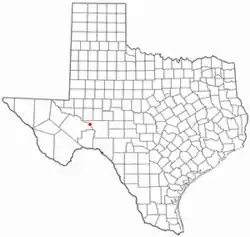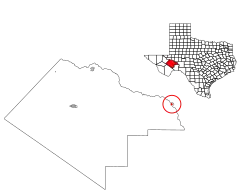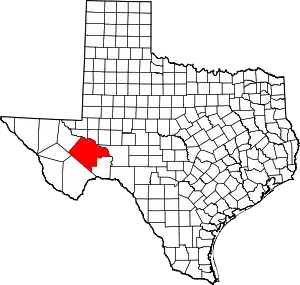Iraan, Texas
Iraan (/ˌaɪrəˈæn/ EYE-rə-AN)[5] is a city in Pecos County, Texas, United States. Its population was 1,229 at the 2010 census. The city's name is an amalgamation of the first names of Ira and Ann Yates, owners of the ranch land upon which the town was built.[6]
Iraan, Texas | |
|---|---|
 Location of Iraan, Texas | |
 | |
| Coordinates: 30°54′49″N 101°53′55″W | |
| Country | United States |
| State | Texas |
| County | Pecos |
| Area | |
| • Total | 0.62 sq mi (1.60 km2) |
| • Land | 0.62 sq mi (1.60 km2) |
| • Water | 0.00 sq mi (0.00 km2) |
| Elevation | 2,221 ft (677 m) |
| Population (2010) | |
| • Total | 1,229 |
| • Estimate (2019)[2] | 1,222 |
| • Density | 1,980.55/sq mi (764.95/km2) |
| Time zone | UTC-6 (Central (CST)) |
| • Summer (DST) | UTC-5 (CDT) |
| ZIP code | 79744 |
| Area code | 432 |
| FIPS code | 48-36128[3] |
| GNIS feature ID | 1360022[4] |
History
Iraan was an oil boom town, and it developed quickly after the discovery of the gigantic Yates Oil Field, which is adjacent to the town on the southwest. The oil field was discovered in 1926, and the first buildings in town were basic housing and infrastructure for workers on the field, all built by the Big Lake Oil Company, which became Plymouth Oil Company, which was purchased by the Ohio Oil Company, then purchased by Marathon Oil Company, and owned today by Kinder Morgan. By 1927, the town included a school, and the post office appeared in 1928. The population of the town in 1930 was about 1,600.[7] About 3 mi (5 km) south of Iraan was the oil boomtown of Redbarn, which appeared almost immediately after discovery of the oil field, before Iraan itself. It was a collection of tents and shanties in the immediate vicinity of Ira Yates's ranch. Yates donated 152 acres (0.62 km2) of his ranch to the town of Iraan to encourage further development there, and in 1952, the town of Redbarn, which never had a permanent population more than 75, was finally abandoned.[8]
One of Iraan's most famous residents was V.T. Hamlin, the creator of the comic strip Alley Oop. Originally from Iowa, he worked in Iraan during the oil boom period of the late 1920s, and he either got the idea for the strip or created its earliest drafts there; the strip was first published in 1932 in Des Moines. He moved back to Iowa in 1929 and later to Florida. A park in Iraan is named after the strip.[7][9]
In 2021, Jason Rybolt, the CEO of Iraan General Hospital, stated that Iraan had a 42% positivity rate of COVID-19. Rosa Flores and Ashley Killough of CNN described the town as being hard hit by the COVID-19 pandemic in Texas in 2021.[10]
Geography
Iraan is located at 30°54′49″N 101°53′55″W (30.913511, –101.898614).[11] According to the United States Census Bureau, the city has a total area of 0.6 square miles (1.6 km2), all land. State Highway 349 and U.S. Highway 190 converge at Iraan. The Pecos River loops around the town to the north and east.
Climate
According to the Köppen climate classification system, Iraan has a semiarid climate, BSk on climate maps.[12]
Demographics
| Census | Pop. | Note | %± |
|---|---|---|---|
| 1960 | 1,255 | — | |
| 1970 | 996 | −20.6% | |
| 1980 | 1,358 | 36.3% | |
| 1990 | 1,322 | −2.7% | |
| 2000 | 1,238 | −6.4% | |
| 2010 | 1,229 | −0.7% | |
| 2020 | 1,055 | −14.2% | |
| U.S. Decennial Census[13] | |||
2020 census
| Race | Number | Percentage |
|---|---|---|
| White (NH) | 366 | 34.69% |
| Black or African American (NH) | 1 | 0.09% |
| Native American or Alaska Native (NH) | 6 | 0.57% |
| Asian (NH) | 10 | 0.95% |
| Mixed/Multi-Racial (NH) | 17 | 1.61% |
| Hispanic or Latino | 655 | 62.09% |
| Total | 1,055 |
As of the 2020 United States census, there were 1,055 people, 384 households, and 291 families residing in the city.
2000 census
At the 2000 census,[3] 1,238 people, 427 households, and 335 families resided in the city. The population density was 2,234.3 inhabitants per square mile (862.7/km2). The 542 housing units averaged 978.2 per square mile (380.5/km2). The racial makeup of the city was 92.00% White, 0.08% African American, 0.08% Native American, 6.22% from other races, and 1.62% from two or more races. Hispanics or Latinos of any race were 36.51% of the population.
Of the 427 households, 45.7% had children under the age of 18 living with them, 70.3% were married couples living together, 4.2% had a female householder with no husband present, and 21.5% were not families. About 20.1% of all households were made up of individuals, and 7.7% had someone living alone who was 65 years of age or older. The average household size was 2.90 and the average family size was 3.37.
Age distribution was 32.5% under the age of 18, 6.9% from 18 to 24, 30.3% from 25 to 44, 20.4% from 45 to 64, and 9.9% who were 65 years of age or older. The median age was 33 years. For every 100 females, there were 101.3 males. For every 100 females age 18 and over, there were 101.0 males.
The median household income was $44,583, and median family income was $48,207. Males had a median income of $40,345 versus $22,396 for females. The per capita income for the city was $15,589. About 5.0% of families and 7.2% of the population were below the poverty line, including 9.3% of those under age 18 and 7.6% of those age 65 or over.
Education
Public education in the city of Iraan is provided by the Iraan-Sheffield Independent School District.
References
- "2019 U.S. Gazetteer Files". United States Census Bureau. Retrieved August 7, 2020.
- "U.S. Census website". United States Census Bureau. Retrieved January 31, 2008.
- "US Board on Geographic Names". United States Geological Survey. October 25, 2007. Retrieved January 31, 2008.
- "How to Pronounce: H-I Cities". TexasTripper.com Texas Travel Guide.
- "From Bug Tussle to Tarzan, here are 40 of the oddest Texas town names". Click2Houston. Retrieved August 23, 2020.
- "- Texas State Historical Association (TSHA)". tshaonline.org.
- "- Texas State Historical Association (TSHA)". tshaonline.org.
- "Alley Oop is a Texan?". texasescapes.com.
- Flores, Rosa; Killough, Ashley (August 23, 2021). "So many people in this Texas town got Covid-19 that the school district shut down and then the city essentially closed". CNN. Retrieved August 23, 2021.
- "US Gazetteer files: 2010, 2000, and 1990". United States Census Bureau. February 12, 2011. Retrieved April 23, 2011.
- "Iraan, Texas Köppen Climate Classification (Weatherbase)". Weatherbase.
- "Census of Population and Housing". Census.gov. Retrieved June 4, 2015.
- "Explore Census Data". data.census.gov. Retrieved May 19, 2022.
- https://www.census.gov/
- "About the Hispanic Population and its Origin". www.census.gov. Retrieved May 18, 2022.
